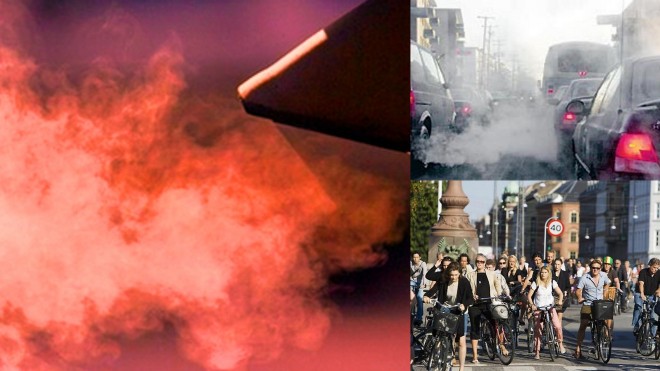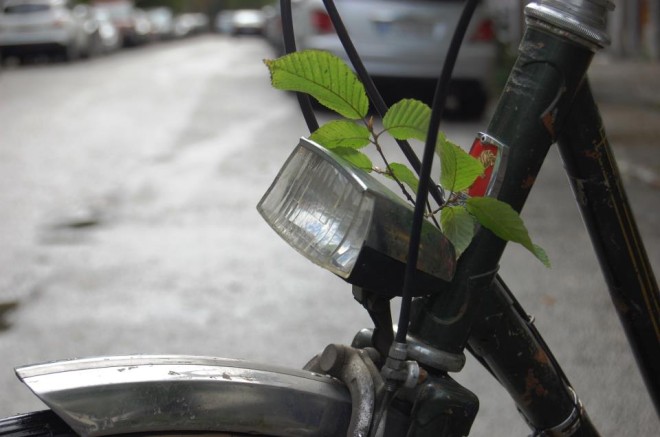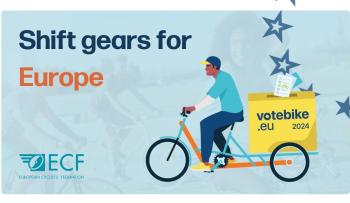
Hold Your Breath: Europe’s Deadly Transport Regime
A new report from the European Environment Agency should set the alarm bells ringing. Europe’s transport regime is killing its citizens. ECF’s Environment Policy Officer explains how cycling can reverse this trend.
You’d be surprised just how dangerous air pollution is in Europe. A new report from the European Environment Agency (EEA) shows that in many parts of Europe, air is simply becoming too toxic to breathe.
According to their report, harmful nitrogen dioxide (NO2) and particulate matters (PM10) have been found to exceed limits in more than a third of testing areas. You may be wondering what these substances are. Well they’re not nice. According to the EEA “these pollutants can affect the cardiovascular system, lungs, liver, spleen and blood”.
It would appear that transport has become a dangerous game. Air pollution from traffic kills some 200,000 people per year in the European Union. (Add noise pollution to the equation and you’re looking at another 250,000 deaths.)
So what’s causing all this toxic air? Part of the problem undoubtedly lies in cars. According to the report, private car use has stayed more or less steady despite the economic downturn and wide fuel price fluctuations over the last decade. And even more worryingly, buying a car has become steadily cheaper in real terms since the mid-1990s while train travel and passenger transport by water has become more expensive.
Yet as it currently stands, transport policy on the EU level is not yet brave enough to change the way we move. It’s still bent on ‘technological solutions’ such as e-cars and fuel efficiency. These solutions can only go so far.
“The application of technology has been the primary means of reducing the environmental impacts of transport in the last two decades,” explains Alfredo Sánchez Vicente, a transport expert at EEA.
“But it is clear that measures for reducing the impact of transport emissions and noise can be either technical or non-technical. Action to reduce emissions (greenhouse gases, air pollutants and noise) from vehicles through shifting to alternative modes (the 'shift' principle) and to cleaner fuels and improved vehicle technology (the 'improve' principle), should be complemented by better managing transport demand (the 'avoid' principle). Growing transport demand negates many of the benefits of technology development.”
In other words, technology won’t be able to save the day. We’re going to have to think about changing the way people move if we want a cleaner more sustainable Europe.
Bicycle O’Clock?
According to the EEA, bicycles should be an important tool for cleaning up the transport sector.
“Non-motorised transport can and should play a major role in improving the quality of life of Europeans,” explains Sánchez Vicente.
"Driving a car on a short trip is kind of like using a 12 tonne lorry to deliver a loaf of bread"
“The challenge is to remove barriers to commuting by bicycle, including cultural and infrastructural barriers, but also in terms of safety. We know that its use is exponential: the more bikes on the road, the more pleasant and less dangerous it is to commute by bike, and more infrastructure becomes available. All administration levels need to help trigger this positive cycle.”
Indeed, more bicycles in the transport mix could be a godsend. But it’s going to take time and investment. People won't cycle if they don't feel safe, and to feel safe they need adequate infrastructure. The real reason the Dutch cycle is because the the government spends on average €25 per head on cycling.
Governments often don't give enough money to cycling because people tend to cycle short distances. While many policy makers see this as a limitation, they should see it as an opportunity. Driving a car on a short trip is kind of like using a 12 tonne lorry to deliver a loaf of bread: it’s horribly inefficient. During the first three kilometres of a car trip, exhaust emissions are more than 50 times higher per kilometre due to urban traffic conditions and a cold engine. With 30% of motorized trips shorter than 3 kilometres, that's a lot of unnecessary toxins being pumped out into the air.
At the end of the day, getting more people cycling is not a question of liking bicycles or not. It’s a question of creating cities where people can actually live. Being able to breathe clean air shouldn't be a privilege.
 About the Author
About the Author
Benoit Blondel is the Environment Policy Officer for ECF. He’s the author of ECF’s CO2 Study: Cycle More Often 2 Cool Down The Planet.
Contact the author
Recent news!
Contact Us
Avenue des Arts, 7-8
Postal address: Rue de la Charité, 22
1210 Brussels, Belgium











